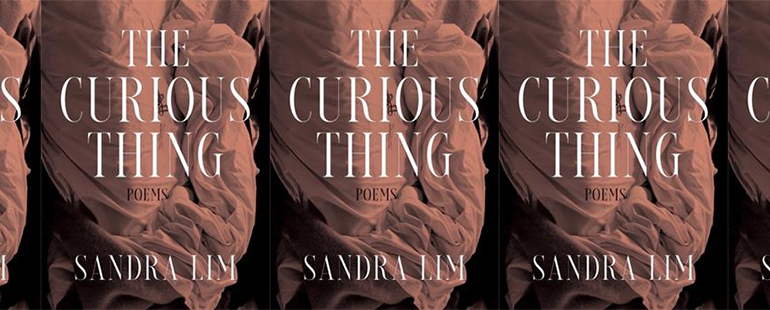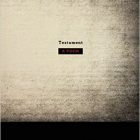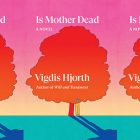Sandra Lim’s Rigorous Thinking in The Curious Thing

The Curious Thing
Sandra Lim
W.W. Norton | September 14, 2021
Sandra Lim is a poet whose straightforward yet daring intelligence demands a reader keep up. The poems in her third book, The Curious Thing, evoke a mind constantly examining itself and the world it occupies. Lim’s isolated speakers’s contemplation develops across individual lines, sentences, and stanzas, and it’s especially gratifying to see her grapple directly with the act of writing itself, scrutinizing her impulses that compel her to create. She does this mainly by examining the past: her speakers long for the things they write about. Quite simply, Lim’s speakers can’t help but look back in time, often with regret or desire, at what once was.
We see this in the collection’s first poem, “The Protagonists,” which emphasizes a schism between the subject of a poem (the past self, unaware of the future)—“At one time, / I asked for everything”—and the speaker of the poem, who understands life in hindsight—“But now I sing of the fat, sleepy / little censor / who has replaced me, whose disappointments // create the life of the house.” That “little censor” reads as the speaker, whose disappointments create the “the life of the house”—in other words, fuel for her poems. And why reflect on this process? “What does the human heart love?” Lim asks. For Lim, reflection itself, the speaker looking back at and evaluating the past, is innate and inevitable. The process of arriving at a point in time after longing for it, seeking the sense of achievement it entails—“to go, to have so far to go”—is like being in love. The disappointments associated with remembering the past are simply an aspect of that complex love—“the supreme gaiety” of the heart is “a stone/ flung from a volcano,” such a complex feeling wrapped up in a natural, yet paradoxically violent and playful image.
Directly addressing the act of writing as she does here and throughout the book is the act of a poet compelled to reflect on their past writing (and self), and the quality of mind that helped create it, perhaps unconsciously. For such an introspective endeavor, Lim uses the fitting techniques she’s made her hallmark. Rarely does one find a contemporary poet quite as instructive in the consistent employment of finely-constructed, rich abstraction. Striking instances shine through entire already-idea-dense poems in bright moments, exemplified in these stanzas in the poem “Jean Rhys”:
but spirit needs a house,
and the brief pageant of being
escorted through
the grieving joy of words
set down right.
These abstractions are fitted effortlessly into a winding syntax divided into individual lines, revealing a complex thought, unravelling on the page. The structure mimics how meaning moves through one’s mind. At the outset, the word “but” reminds us the thought embodied by these lines only serves to complicate a preceding idea. Because of the phrase “spirit needs a house,” we might initially read “being” in the subsequent line as a noun: “spirit needs a house and the brief pageant of being.” Yet the enjambment here allows “being” to suddenly become a verb, drawing our attention from existence to the act of existing. This shift directs the reader to contemplate the need for “spirit” to be embodied metaphorically in a “house,” leading to an ephemeral existence: “the brief pageant of being.”
Lim then leads us to the discovery that another action is necessary for grounding “spirit”: the spectacle of utilizing precise language. The sequence draws our attention away from the essence of “spirit” and instead to the process of thinking and writing itself. When we read that spirit needs “the grieving joy of words,” forming a moment for pause in which the syntax and the thought again seems complete, the completion is quickly interrupted by the stanza’s last line, which further complicates the meaning: the “grieving joy” doesn’t belong to the words, but to the act of words “being set down right.” This is at the core of the collection: thinking and writing becomes a necessary, irresistible act, and the source of the complex emotion of joy, and grief, identified here.
Lim achieves such rich textures of thought due to her attention to syntax and lineation. The idea that “spirit needs to be escorted . . . through words set down right” is a fitting way to describe her work in this collection. Action and process are emphasized; abstract nouns, ideas themselves, are unavoidably prominent, and spirit is escorted through grief and joy. This compelling third collection, showcases Lim’s rigorous thought at its best.



